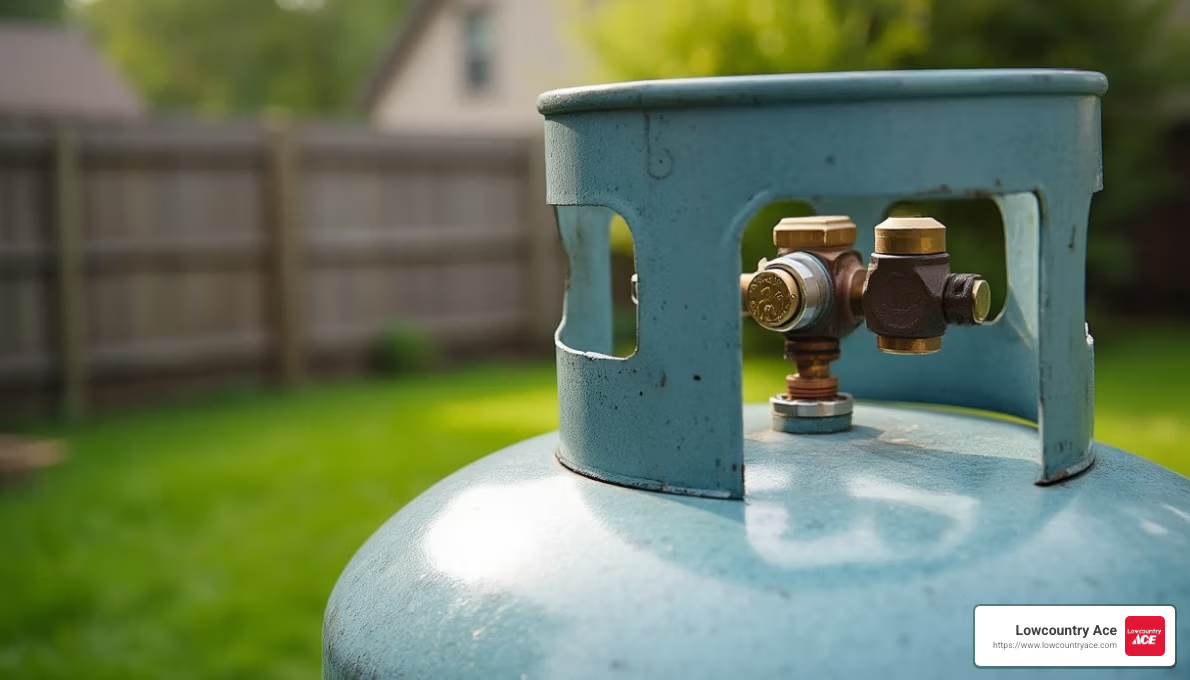Propane Tank Service Life: 5 Essential Tips 2025
Understanding propane tank service life is crucial for safety and efficiency. These tanks typically last for about 12 years from the manufacture date. Here’s a quick guide to get you started:
- Longevity: Under optimal conditions, propane tanks can last 30+ years, especially underground ones with proper care.
- Safety: Regular inspections for leaks and rust ensure safety.
- Expiration: Tanks often expire after 12 years; check the date stamped on the collar.
The helpful team at Lowcountry Ace is here to guide you through the ins and outs of propane tank service life. With years of experience, they offer practical tips and expert advice to help maintain your propane tanks effectively.
Understanding Propane Tank Service Life
Propane tanks are a vital part of many homes, providing fuel for heating, cooking, and more. But how long can you rely on them? Let’s break down the propane tank service life.
Propane Tank Lifespan
Most propane tanks are designed to last 12 years from the date of manufacture. After this, they need to be requalified for continued use. With proper care, underground tanks can serve you for over 30 years. Above-ground tanks can also last long, but they require more attention due to exposure to the elements.
Maintenance
Regular maintenance is key to extending your tank’s life. Here are some simple steps:
- Visual Inspections: Check monthly for rust, dents, or leaks. Catching these early can prevent bigger problems.
- Cleaning: Clean the tank’s exterior quarterly to prevent dirt buildup, which can lead to rust.
- Leak Testing: Conduct every six months. A simple soapy water test can reveal leaks – bubbles indicate a problem.
Recertification
After 12 years, your propane tank must be recertified. This process ensures the tank still meets safety standards. You can find the manufacturing date on the tank’s collar. If it reads “07-22,” it was made in July 2022. Recertification extends the tank’s service life by another five years before needing another check.
Regular inspections and professional servicing can keep your tank in top shape. The helpful team at Lowcountry Ace is ready to assist with maintenance and recertification needs, ensuring your propane supply remains safe and efficient.
Next, let’s explore the factors that can impact the longevity of your propane tank.
Factors Affecting Propane Tank Longevity
Understanding what affects your propane tank’s lifespan can help you get the most out of it. Let’s explore the three main factors: usage rate, climate impact, and tank size.
Usage Rate
How often you use propane is a big factor in how long your tank lasts. Think of it like a car’s fuel tank. The more you drive, the more often you need to fill up.
-
Frequent Use: If you use propane for heating, cooking, and other appliances daily, expect your tank to deplete faster. This means more frequent refills and a shorter duration between them.
-
Occasional Use: Using propane less often, like just for a grill, can make your tank last much longer between refills.
Climate Impact
The weather in your area can also affect how long your propane lasts.
-
Cold Climates: In colder regions, propane vaporizes faster, leading to increased consumption. This means you’ll use up your propane more quickly in the winter months.
-
Warm Climates: Warmer weather slows down propane evaporation. If you live in a warmer area, your propane consumption rate might be lower.
Tank Size
The size of your propane tank directly impacts how often you’ll need to refill it.
-
Large Tanks: A 500-gallon tank, for example, can last anywhere from 2 to 14 months, depending on your usage rate. Larger tanks mean fewer trips for refills.
-
Small Tanks: Smaller tanks, like a 250-gallon one, will need refilling more often, typically lasting about a month under regular use.
Choosing the right tank size based on your needs can help you manage your propane supply more efficiently.
By considering these factors, you can better plan your propane usage and ensure your tank lasts as long as possible. Next, we’ll look at how to determine your propane tank’s expiration.
How to Determine Your Propane Tank’s Expiration
Knowing when your propane tank is due for inspection or requalification is crucial for safety and efficiency. Here’s how you can keep track of your tank’s expiration.
Inspection
Regular inspections are key to ensuring your propane tank is in good condition. Look for visible signs of wear and tear, such as:
- Dents or Bulges: Any physical damage can compromise the tank’s integrity.
- Corrosion or Rust: Surface damage can weaken the tank over time.
- Leaks: Use soapy water around the valves and connections. Bubbles indicate a leak.
If you notice any of these issues, it’s time to take your tank to a professional for a thorough check-up.
Requalification
In the U.S., propane tanks need requalification after 12 years from the manufacture date. After the first requalification, they need it every five years.
To find out when your tank was last requalified:
- Check the Collar or Handle: Look for a date stamp in the “Month-Year” format, like “07-22” for July 2022.
- Look for Requalification Marks: These might be a series of letters and numbers indicating the requalification date.
If your tank is due for requalification, take it to a certified professional to ensure it meets safety standards.
Safety Checks
Performing regular safety checks can prevent accidents and extend your propane tank’s service life.
- Secure Connections: Ensure all valves and connections are tight and secure.
- Stable Placement: Keep the tank on a stable, level surface to prevent tipping.
- Proper Ventilation: Make sure the area around your tank is well-ventilated to avoid gas accumulation.
These simple checks can help you maintain your tank safely and effectively.
By staying on top of inspections, requalifications, and safety checks, you can ensure your propane tank remains in top condition. Next, we’ll explore tips for extending your propane tank service life.
Tips for Extending Propane Tank Service Life
Want to get the most out of your propane tank? Here’s how you can extend its life while keeping safety a priority.
Efficient Appliance Use
Using your appliances efficiently can significantly impact the propane tank service life. Here are some tips to help:
- Adjust Thermostats: Keep your heating and cooling systems at optimal settings to reduce propane usage.
- Use Energy-Efficient Appliances: Consider upgrading to appliances designed to use less fuel.
- Turn Off When Not in Use: Make sure to turn off heaters, grills, or any propane-powered devices when they’re not needed.
These simple adjustments can help you conserve propane and decrease the frequency of refills.
Regular Maintenance
Regular maintenance is like a routine check-up for your propane tank. It helps catch small issues before they become big problems.
- Monthly Checks: Inspect your tank for dents, rust, and leaks. Use soapy water to check valves and connections for leaks.
- Annual Professional Servicing: Hire a professional to perform a thorough inspection at least once a year. They can spot issues you might miss and ensure your tank is in peak condition.
Regular maintenance not only extends the life of your tank but also ensures it operates safely.
Professional Servicing
While self-checks are crucial, nothing beats the expertise of a professional. They provide detailed inspections and maintenance that can prevent accidents and extend the tank’s lifespan.
- Leak Detection: Professionals have the tools to detect leaks that aren’t visible to the naked eye.
- Valve and Seal Checks: They ensure all parts are functioning correctly and replace any that are worn out.
- Expert Advice: The helpful team at Lowcountry Ace can offer tips on how to maximize your tank’s efficiency and safety.
Professional servicing is an investment in the longevity and safety of your propane tank.
By using your appliances efficiently, maintaining regular checks, and engaging professional services, you can significantly extend the propane tank service life. Up next, let’s tackle some frequently asked questions about propane tank service life.
Frequently Asked Questions about Propane Tank Service Life
How many years can a propane tank be in service?
Propane tanks have a shelf life, but they don’t “expire” like food. In the U.S., a propane tank is typically certified for 12 years from the date of manufacture. After this period, it needs to be recertified to ensure it’s still safe for use. Once recertified, the tank can be used for an additional five years before needing another inspection.
To check how long your tank has been in service, simply look for the date stamped on the collar of the tank. This is the manufacture date, formatted as “Month-Year” (e.g., “07-22” for July 2022).
Is it worth it to recertify a propane tank?
Recertifying a propane tank is often worth it, especially if the tank is in good condition. Safety is the main reason for recertification. It ensures the tank meets all safety standards, reducing the risk of leaks or accidents.
The cost of recertification is generally lower than buying a new tank. However, if the tank shows visible damage like dents or rust, it might be more cost-effective to replace it. Always consult with a professional, like the helpful team at Lowcountry Ace, for advice on whether recertification or replacement is the best option.
How to tell if a propane tank is expired?
To determine if your propane tank is “expired” or needs recertification, you’ll need to inspect the tank for a few key indicators:
-
Manufacture Date: Check the date stamped on the tank’s collar. If it’s been more than 12 years, it’s time for recertification.
-
Requalification Date: After recertification, the tank will have a new date indicating when it was last inspected. This date is crucial to know when the next inspection is due.
-
Visual Inspection: Look for any signs of wear and tear, such as rust, dents, or valve issues. If you notice any of these, it’s important to have the tank inspected by a professional.
Regular inspections and staying aware of these dates help ensure your tank is safe and ready for use. Always prioritize safety when dealing with propane tanks.
Next, we’ll wrap up with some final thoughts and insights into Lowcountry Ace’s propane tank services.
Conclusion
At Lowcountry Ace, we understand the importance of keeping your propane tank in top condition. Our propane tank services are designed to ensure safety, efficiency, and peace of mind for all our customers. Whether you’re on James Island, Folly Beach, or in Charleston, SC, our team is here to help you with all your propane needs.
We offer a range of services, from propane refills to professional inspections and maintenance. Our knowledgeable staff is always ready to assist you in determining the best course of action for your propane tank, whether it’s recertification or replacement. We focus on providing personalized service, ensuring that every customer receives the attention and expertise they deserve.
At Lowcountry Ace, we pride ourselves on our commitment to the community. Our friendly and experienced team is always available to answer your questions and provide guidance on propane tank safety and longevity. We believe in empowering our customers with the knowledge they need to make informed decisions about their propane usage.
For more detailed information on our propane services, please visit our propane refill and exchange page. Here, you can find everything you need to know about maintaining your propane tank and ensuring it serves you well for years to come.
Thank you for choosing Lowcountry Ace. We’re here to support you with quality service and expert advice, helping you keep your home running smoothly and safely. We look forward to serving you and being your trusted partner in propane tank care.
Lowcountry Ace Hardware: Your one-stop shop for home improvement. We offer quality products from trusted brands and expert advice from our experienced staff. Located on James Island, visit us for tools, hardware, fishing gear, power tools, building materials, grills & smokers, electrical and plumbing supplies, and more.






